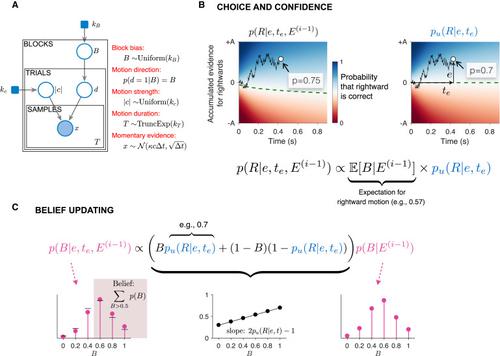Our official English website, www.x-mol.net, welcomes your
feedback! (Note: you will need to create a separate account there.)
Counterfactual Reasoning Underlies the Learning of Priors in Decision Making.
Neuron ( IF 14.7 ) Pub Date : 2018-Sep-05 , DOI: 10.1016/j.neuron.2018.07.035 Ariel Zylberberg , Daniel M. Wolpert , Michael N. Shadlen
Neuron ( IF 14.7 ) Pub Date : 2018-Sep-05 , DOI: 10.1016/j.neuron.2018.07.035 Ariel Zylberberg , Daniel M. Wolpert , Michael N. Shadlen

|
Accurate decisions require knowledge of prior probabilities (e.g., prevalence or base rate), but it is unclear how prior probabilities are learned in the absence of a teacher. We hypothesized that humans could learn base rates from experience making decisions, even without feedback. Participants made difficult decisions about the direction of dynamic random dot motion. Across blocks of 15-42 trials, the base rate favoring left or right varied. Participants were not informed of the base rate or choice accuracy, yet they gradually biased their choices and thereby increased accuracy and confidence in their decisions. They achieved this by updating knowledge of base rate after each decision, using a counterfactual representation of confidence that simulates a neutral prior. The strategy is consistent with Bayesian updating of belief and suggests that humans represent both true confidence, which incorporates the evolving belief of the prior, and counterfactual confidence, which discounts the prior.
中文翻译:

反事实推理是决策先验学习的基础。
准确的决策需要先验概率的知识(例如患病率或基本率),但是尚不清楚在没有老师的情况下如何学习先验概率。我们假设,即使没有反馈,人类也可以从经验决策中学习基本费率。参与者对动态随机点运动的方向做出了艰难的决定。在15-42次试验中,有利于左或右的基本比率各不相同。参与者没有被告知基本费率或选择的准确性,但是他们逐渐偏向他们的选择,从而提高了决策的准确性和信心。他们通过使用模拟反常先验的置信度的反事实表示来更新每个决策后的基本利率知识,从而实现了这一目标。
更新日期:2018-08-17
中文翻译:

反事实推理是决策先验学习的基础。
准确的决策需要先验概率的知识(例如患病率或基本率),但是尚不清楚在没有老师的情况下如何学习先验概率。我们假设,即使没有反馈,人类也可以从经验决策中学习基本费率。参与者对动态随机点运动的方向做出了艰难的决定。在15-42次试验中,有利于左或右的基本比率各不相同。参与者没有被告知基本费率或选择的准确性,但是他们逐渐偏向他们的选择,从而提高了决策的准确性和信心。他们通过使用模拟反常先验的置信度的反事实表示来更新每个决策后的基本利率知识,从而实现了这一目标。

































 京公网安备 11010802027423号
京公网安备 11010802027423号